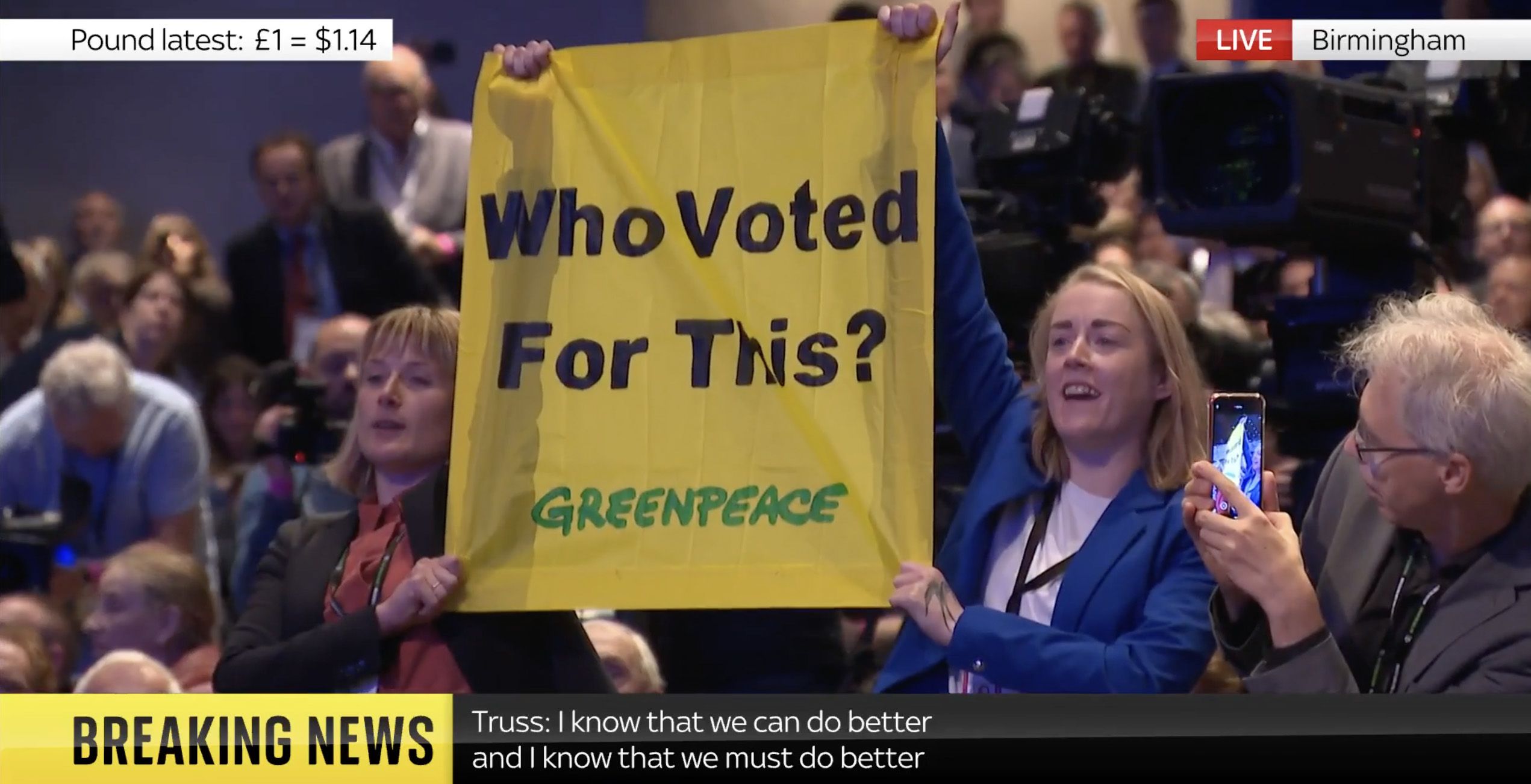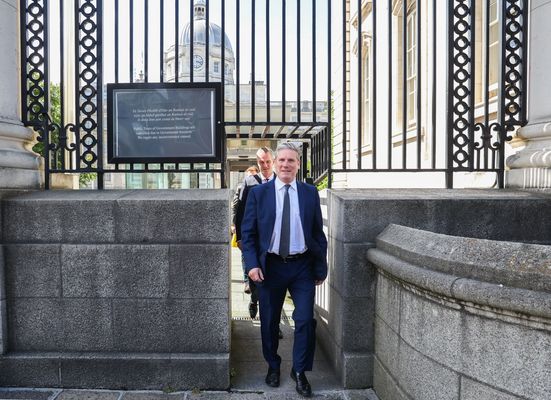THE most important message from the Tory Party conference last week came from Ami McCarthy and Rebecca Newsom who work for Greenpeace. During prime minister Liz Truss’ speech, they held up a banner asking, “Who voted for this?”. Anticipating that the angry men surrounding them would snatch the banner – as indeed they did – Ami and Rebecca had come with a couple of back-up banners. “Let’s get them removed” was the prime minister’s response – and she wasn’t referring to the banners.
It didn’t take the Daily Mail long to carry out background checks. It discovered from Facebook posts that Ami “is no stranger to controversy”, as a couple of years ago, “she mounted an attack on British foreign policy”, arguing that the British Army had “ruin[ed] most of the world”.
Some suggested that Truss “handled it well” but unfortunately for her, even Tory die-hards like Nadine Dorries were repeating the Greenpeace message: there was no mandate for the Truss agenda, so an election must be called. It is a measure of the division, chaos and incompetence within Downing Street that Truss even vetoed a small plan from Rees-Mogg’s department to encourage everyone to save energy this winter. But back to Dorries, the post-truth former Culture Secretary who backed Truss for Tory leader. It was Dorries who decided that Channel Four should be privatised because she thought, wrongly, it was “in receipt of public money”. C4 is funded commercially but publicly owned. Its crime is that it hosts the only news programme worth watching on British TV, one that is routinely boycotted by government ministers. No wonder Dorries lasted only twelve months in post (though Truss wanted her to stay on).
Q: Seems to me that there’s bit of a crisis of leadership. It's not just former cabinet ministers criticising policies, forcing you to u-turn, it’s loyalist Nadine Dorries who backed you, a key backer, now saying you don't have a mandate for what you're trying to do? https://t.co/wqntzYbRoa
— Beth Rigby (@BethRigby) October 4, 2022
Another thing we heard from Truss last week was a new version of “enemies of the people”. Rebranded as the “anti-growth coalition”, the new enemies include: “Labour, the Lib-Dems, the SNP, the militant unions, the vested interests dressed up as think tanks, the talking heads, the Brexit deniers, Extinction Rebellion…”. The list went on and on, but while the Scots were name-checked, there was no explicit reference to the Irish, just the oblique mention of the majority here who opposed Brexit.
Reginald Perrin and the original anti-growth coalition (1977)pic.twitter.com/cBLDe5kTtN
— Tides of History (@labour_history) October 8, 2022
The Truss free market libertarian cult is very rapidly coming up against the realities of bond markets, pension funds, mortgage rates, the energy crisis and the economic contraction that is a consequence of Brexit. On the political front, she is discovering that only a small minority of Tory MPs belong to her cult, while others understand there is a climate crisis, biodiversity needs protecting and that cutting the benefits of millions of people might not be the smartest thing to do right now. Shaming claimants might have worked in the 1980s, but with today’s growing destitution such rhetoric just sounds out of touch and unhinged. Protests against the licensing of more fossil fuel extraction will intensify.
"The United Nations has said we should have no new oil. Liz Truss wants to open 130 new oil licences, that's a death sentence to this planet." Nobody cares what Tories do in England but when it affects planet rest of the world must take action.https://t.co/QZhuY8U9Y9
— Leána Ní Laochdha 🇮🇪🇪🇺🇵🇸 Socialist, BLM. (@Helsleahy) October 10, 2022
Before Truss, Tory governments relied heavily on the right wing lobby group, Policy Exchange. They adopted ideas cooked up by PE and frequently held press conferences with the PE logo in the background. One of PE’s themes was to strengthen the union and under Johnson’s government, two new cabinet committees were established: a Union Strategy committee and a Union Policy Implementation committee. In May 2021, senior civil servant Sue Gray – remember her? – was given responsibility for the union and the constitution. Five months later she moved to the ridiculously-named Levelling Up department. Truss seems to have swept all this aside. The union cabinet committees are no more.
No wonder there is nervousness within the DUP and the News Letter is running headlines saying, “Truss offers little comfort to unionists”. Only in the News Letter do better British/Irish relations and the vague possibility of settling the protocol issue, get front page treatment such as, “alarm for loyalists”.
How long the Institute of Economic Affairs, the Tax Payers’ Alliance etc will survive as Tory government influencers, without needing further input from Policy Exchange, is unclear. One thing that PE understands is that Brexit, which it supported, is a major ‘push’ factor in breaking up the union, even if the current rot started with the austerity policies that pre-date the Brexit referendum of six years ago.
"BBC programmes...speakers from...Institute of Economic Affairs...Adam Smith Institute...Taxpayers’ Alliance...Centre for Policy Studies...Policy Exchange...rated by the campaign Who Funds You? as among the most opaque of all those it investigated."https://t.co/1Yieb0vJQP
— Laura Sykes (@layanglicana) October 10, 2022
Public services, including the core of health, education and social security, have become so degraded over the last decade that it becomes more and more difficult to make the case for the union on the basis of the ‘superiority’ of the British welfare state. The Truss vision of a “lean state” will just push us further away. But what about ‘pull’ factors? Is the Republic that much better?
No – the Republic is rubbish! “Real living standards are 10 per cent higher in Northern Ireland than in the Republic.” At least that’s the verdict of a 75-page Policy Exchange pamphlet published in June, contradicting Bergin and McGuinnes who say the average household is 12 per cent better off in the South. The PE pamphlet set out to trash the idea of an all-island economy “which does not exist in real life” (Lord Frost). The clue was in the title: “The Island of Ireland: Two Distinct Economies” and never the twain shall meet. The protocol is accused of having introduced “a policy aim of protecting the ‘all-island economy’”. But this phrase or concept is nowhere to be found in the protocol, even if it has been used by politicians in arguments about the protocol. What we have instead, in the preamble of the protocol, is a recognition that “cooperation between Northern Ireland and Ireland is a central part of the 1998 Agreement and is essential for achieving reconciliation and the normalisation of relationships on the island of Ireland”. And that includes “supporting continued North-South and East-West cooperation across the full range of political, economic, security, societal and agricultural contexts and frameworks for cooperation”.
So, attacking support for North-South economic activity means attacking the GFA itself. But it gets worse. The pamphlet argues that the volume of North-South trade is so insignificant it’s not worth bothering with. It goes on to argue that the labour market is less stable and more prone to unemployment in the South than the North. It then resorts to prejudice to explain high rates of long-term sickness and disability in the North, benefits for which “have been attractive to those who are unable to work, or prefer not to”. This is just nonsense as benefits for long-term sickness and disability have seen the most severe cut-backs over the last decade. No-one chooses the humiliation of relying on food banks.
There is more prejudice to come. We are told that the take-up of sickness and disability benefits “has always been high in Northern Ireland despite little evidence of unusually severe health problems especially in West Belfast and other strong republican areas where respect for the British state is low. There is evidence that schemes have been less rigorously policed in Northern Ireland than in GB.” No evidence is given for this last point. And for the first point there is in fact very good evidence from surveys of a direct relationship between personal experience of conflict-related events in the past and current mental and physical ill-health.
If the case for the union has to rely on such overt prejudices, then it is doomed. We look forward to the launch of Arlene Foster’s UK Together Foundation next month to see if the arguments have got any better.








